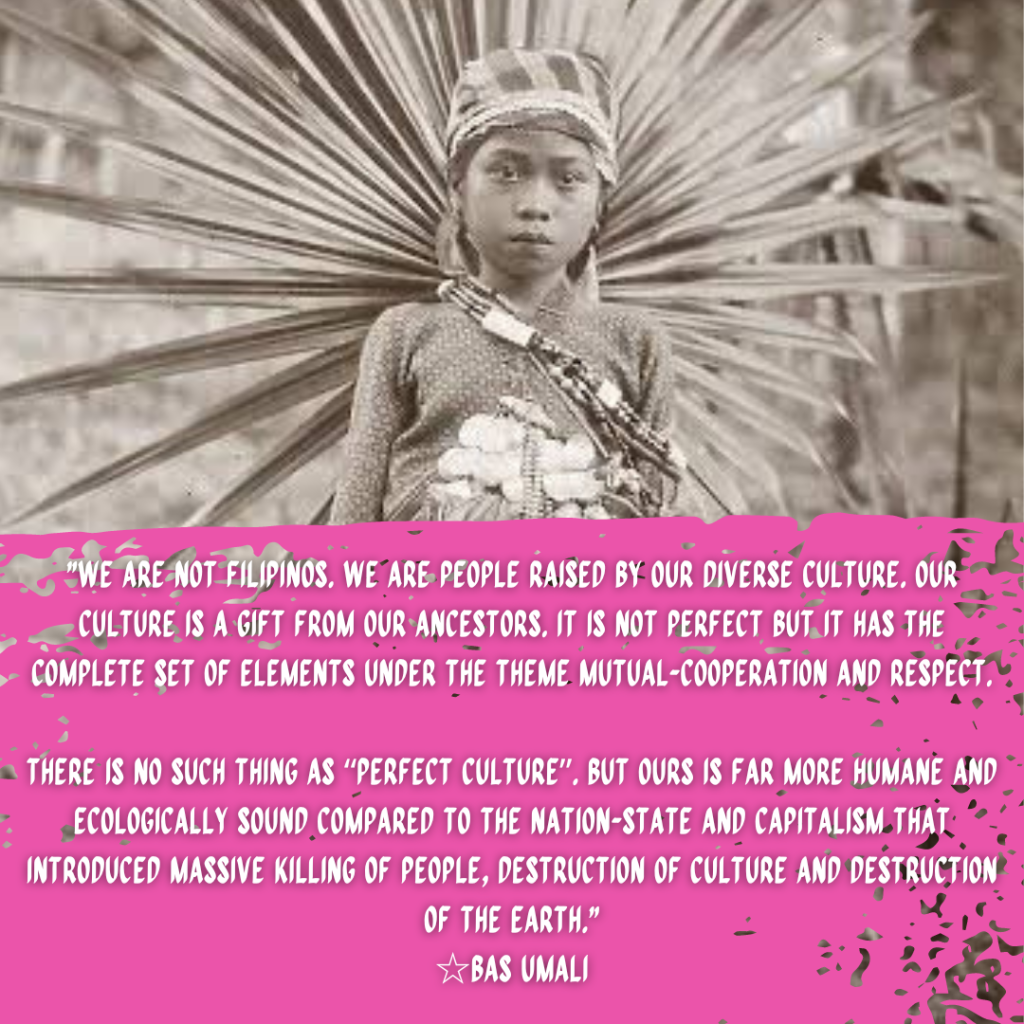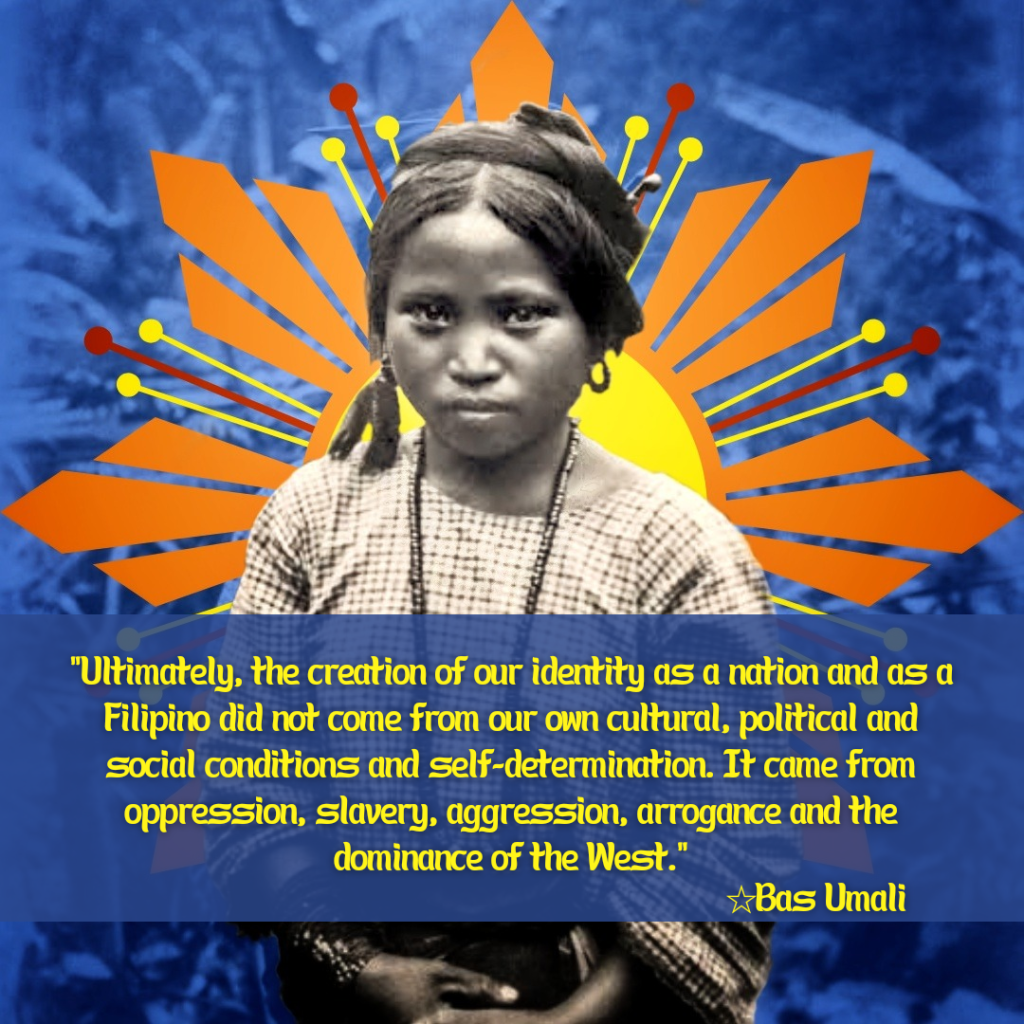
We Are Not Filipino
.
“The term “Filipino” originally refers to an individual born in the archipelago by Spanish parents. Currently, many of us regard Filipino as our superior identity that is upheld by many groups, tribes, ethnolinguistic identity and geographical affiliation in the archipelago. This goes for basically everyone except tribes that remain isolated and people in the southern Philippines who aim to secede and to establish a Muslim nation.
Our sense of nationalism and identity as Filipino was particularly high during the times when revolutionary fervor was strong within us — especially during the Katipunan uprising, People Power I, II and III. However, the meaning of our identity as Filipino continuously changes. After the two major political exercises in EDSA, social and economic conditions have not changed. Unemployment is steadily increasing, hunger is prevalent, political marginalization is alarming, and ecological destruction is rampant throughout the archipelago and has caused the loss of livelihood of millions. After billions of pesos have already been spent on an agrarian reform that started during the Aquino regime, this reform is still far from completion.
Prices of basic commodities are increasing fast while workers’ wages barely move. The peso is gaining strength in relation to the dollar to the detriment of the OFWs who deliver substantial value in government revenues. Corruption is deemed “acceptable” in our culture.
We are maids in Europe and Singapore. prostitutes in Japan, and underpaid workers in the international seafaring industry (David, 2002), while the characteristics of our lives at home are obedience, passivity, individualism, opportunism, corruption, dependency due to the exogenous forces brought by colonization, centralization of power, capitalism and relationships based on competition and hierarchy. These conditions further facilitate the process of decadence of the meaning of “Filipino” that established through coercive processes.
Upon acquiring ideas from the West, native rebels felt compelled to adopt and invent “Filipino” as a national identity to effectively fight Spanish colonizers. The statist framework that governs the Katipunan reinforced this and we totally veered away from the decentralized fashion of the primitive organizations.
Ultimately, the creation of our identity as a nation and as a Filipino did not come from our own cultural, political and social conditions and self-determination. It came from oppression, slavery, aggression, arrogance and the dominance of the West.”
.
☆Bas Umali, ‘Three Stars and a Sun’
.
Everything we associate with the word Filipino comes with the heavy weight of knowing that the Indio of the past would never understand the systems, cultural practices and language we use to speak of the gift they tried to pass down to us. The Katipunan are today considered the forebears of our nation, heroes that are seldom questioned and instead offered blind admiration because they sent the peasantry to die on fields of battle. The fact that the marginalized minorities along the periphery of Spain’s empire were subjugated, forced to adopt the mantle of ‘Filipino’ nationalism is overlooked. The uprising of the majority groups from central Luzon is the mythology we choose to utilize to uphold the story of Philippine statehood. And yet this story isn’t even of our own making. It is an American narrative meant to solidify the feelings of the insurgents and weaponize the longing for independence against the people the United States wanted to subjugate. It is the long lasting death of the autonomous identities once proudly clung to by peoples all across the archipelago. The transforming of tribal cultures into a manageable singular state identity so that the Filipino could be tamed for Western profit.
.
Bas Umali points out that we are not Filipino. That our now cherished identity is one that the West manufactured for us through hundreds of years of colonial abuses. Where we see pride and power in that word, history sees a native peoples trapped by the bastardization of their culture and separation from the cultural practices which once supported both people and land alike.
.
Where Umali and almost all other writers stop before asking is the spot where the question “if we are not Filipino, what are we?” waits to be asked. If we are not the “Latinos of Asia”, the miniature America dropped in Southeast Asia, the little brown brother that Uncle Sam never wanted – then what are we? The process of decolonization meets this far too often by encouraging the far removed modern pinoy to assume a cultural identity based on general locations they have been told their families come from. With no context of migrations, wartime flow of intentionally displaced peoples, or the precolonial mixing of cultures the assumptions nearly always end up being “I’m the descendant of headhunting Igorots” or “my ancestors were Visayan warriors like Lapu-Lapu”. Seldom few seem to admit that if your family historically came from Cavite or Bicol or any place just off the “exotic” side of American anthropologists’ adventure trails in the 1900s then your ancestors probably didn’t look like the Worcester fetish photos you see today. And even if your family did come from those cultures, we cannot emphasize enough that the photos we have today are fetish images from perverted white minds. The dominant concepts of decolonization talked about online today are centered around taking those white man’s versions of the noble savage and trying to rework the fierce Moro barbarian or the blood thirsty Igorot into a modern image of a masculine Filipino that we as history’s bastards can be proud of. And this isn’t a new process, regardless of how ground breaking it feels to current generations. It is the same process that past generations have been trapped in. It is the exact process that brought about the hyper-masculine Filipino male image that Rodrigo Duterte utilized to manufacture his “dirty harry” persona for politics. The same concept of not being the little brown brother in our own still very white friendly way that got us national icons like CIA puppet Magsaysay. Or even on the opposite end of statism, it remains the “warrior” image still utilized by the Maoists of the NPA even as they pretend their concept of a Philippine state isn’t a Spaniard and American ideal repackaged with some communist wording added on top. None of this ever answers what we should be if we are not the Filipino the West created.
.
We believe the state itself can only be “decolonized” when it no longer exists. That statism is at its roots a forced belief placed upon us so as to make our people more easily conquered by foreign imperialists. While anarchy seems like the perfect ‘divide and conquer’ path in the eyes of the statist, it also is preached by them that the chaos of anarchism prevents the solidifying of power necessary for a state. In Umali’s writing he notes that mutualistic and yet decentralized networks existed across the archipelago long before the West arrived. So long before that pre-colonial history records our peoples trading with China to the north, what became Vietnam to the west, and the other Malay peoples in what later became Malaysia and Indonesia to the south and southwest. The networks were visible in how gold mined from the highlands of the Igorots made its way down to the Ilokanos to be refined and traded as far away as northern China and Japan, ultimately bringing iron works and other foreign goods into the mountains despite the highland tribes never being known to the foreigners that traded for their gold. Those mutualistic relationships worked for centuries prior to Spain finding datus that could be sold on the idea of gaining state based power (empire) over the neighbors they had previously only ever engaged in tribal regulated warfare. The Spanish showed how unrestricted warfare, genocide and generational enslavement could offer the weak willed a path to seemingly unlimited power. And that is what our present state based system is. A path for the weak willed, those of poor character, to claim power over all others trapped within these borders. What mutualistic anarchism does is it removes the monopolized power, deconstructs the hierarchy of the state system, and restores the people’s power over the determination of what mutualistic existence on these islands should be. It does not need the image of headaxes and tattoos to be achieved. It does not require the imagined ferocity of Lapu-Lapu, who was probably too old to have killed Magellan himself. It requires the rebuilding of our people’s dignity and the restoration of our rights to determine our own fate beyond what the state limits us to.
.
We are not Filipinos. So what are we to be? If not the eternal slaves of the state the West created, then what can we be?

Leave a comment